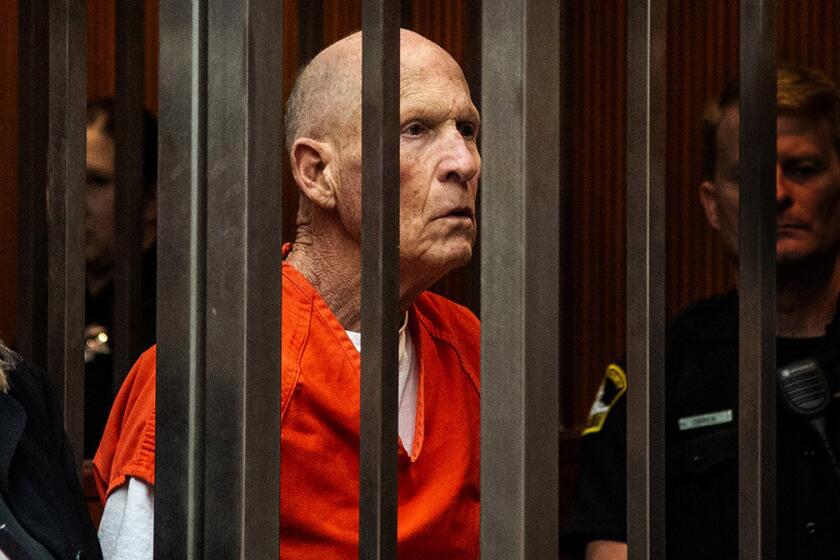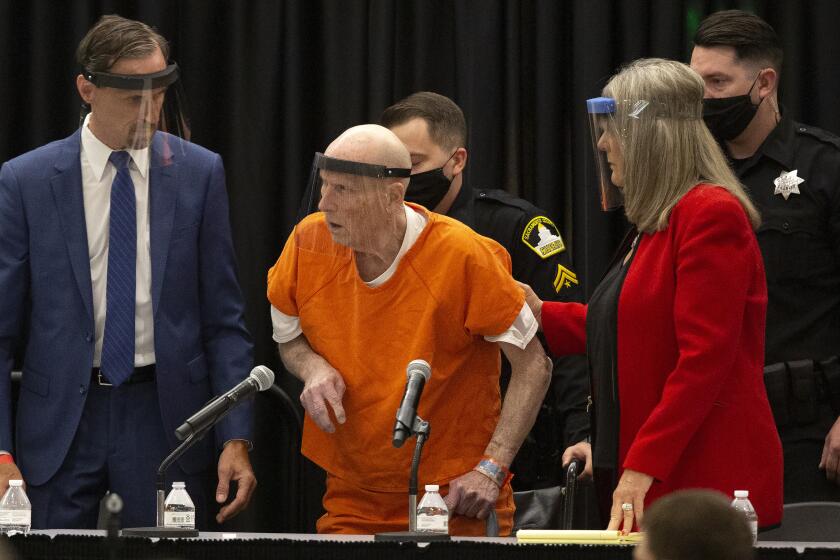Victims of Golden State Killer finally confront him in court with stories of pain and survival
- Share via
SACRAMENTO — Some victims want to show how they overcame and healed.
Some still search for answers and reparation.
And others, unable to exact emotional revenge on their attacker, seek to humiliate him.
The victims of Joseph James DeAngelo Jr., the former police officer whose violent crimes through the 1970s and 1980s terrorized Californians across the state and earned him the moniker Golden State Killer, finally get their say in court with three days of impact statements that began Tuesday, leading up to his sentencing on Friday.
DeAngelo, 74, has admitted to killing 13 people, starting with a Visalia college instructor seeking to thwart the abduction of his daughter in 1975, and ending with the rape and murder of a teenage girl in Orange County in 1986. His plea deal includes 53 attacks on 87 victims in 11 counties, including 50 rapes, but leaves out two sexual attacks and a shooting that also have been blamed on him.
As his victims rose to speak Tuesday, they again and again told of their pain. They recounted how the once-shadowy figure they called an evil monster, a boogeyman, a soulless sadist and the devil had shattered their sense of security — and how his brutality had followed them, and their families, throughout their lives.
Some said they’ve long wondered why they were targeted, or how their lives may have turned out if they hadn’t been.
But they also told of their recovery, how they had been able to summon the strength to serve and support others, to love their families fiercely and, ultimately, to confront their tormentor — still wearing a face mask in the courtroom but finally known to all. Several said they’ve even found it in their hearts or their faith to forgive him.
The hearing began with the first rape DeAngelo has admitted, that of Phyllis Henneman.
With Henneman unable to attend because she is ill with cancer, her statement was read by her sister, Karen Veilleux.
“I went to bed ... not knowing my life would change,” Veilleux read, halting for a moment to choke back sobs.
She described Henneman’s years of anxiety and fear that followed her June 1976 rape.
“The roles have now been reversed,” Veilleux concluded. “He deserves to spend the rest of his miserable life in prison. I am not what happened to me. I am what I choose to become.”
Kris Pedretti was 15 when DeAngelo raped her in December 1976.
“He tormented me. And he told me over and over again he would kill me, and I believed him,” she said. “At three different times that night, I thought I was going to die. I sang ‘Jesus Loves Me’ in my head as I waited to die. The next morning, Dec. 19, I woke up knowing I would never be a child again and, although I was truly grateful to be alive, I also felt that I had died.”
Like many others, Pedretti sought to make DeAngelo squirm, invoking images of his own family suffering similarly.
“I would ask him, ‘Do you feel any remorse for what you did to me? For the people whose lives you sadistically cut short, or to the years of pain for your victims and their families? Do you finally feel humiliated?’” she said.
Others glared at him, and several hurled repeated insults about his anatomy.
“Did his little penis drive him to be so angry all the time?” said Patti Cosper, delivering the impact statement for her mother, Patricia Murphy, who was 29 when she was attacked and repeatedly raped and sodomized in September 1976.
DeAngelo’s gaze briefly flickered at the insult..
But his countenance, largely hidden by a white cloth mask, mostly did not break. He stared straight ahead, seated in a wheelchair between his public defenders, eyes fixed on the small assemblage of reporters allowed in the room and a point on the wall slightly above them.
“Some people are wired wrong, and DeAngelo is one of them,” Cosper read. “Luck finally ran out for this messed-up human being — at least a poor excuse for one. ... He truly is an evil monster with no soul.”
To an early love interest, Joe DeAngelo was energetic and worldly. Now, nearly 50 years later, he stands accused of an extended spasm of violence — home invasions, rapes, murders — in the 1970s and ’80s.
One woman, who identified herself only as Peggy, also was 15 when DeAngelo attacked her and her sister at their home in 1976. She was raped repeatedly and beaten.
“It hurt to brush my hair because he hit me so many times on the head,” she said. Her hands were left numb for months because he had tied them so tightly.
Peggy said her “safety and security were taken away” that night and that, even decades later, “I still always look over my shoulder when someone approaches me from behind.”
However, she also talked about finding a way in 2004 to forgive her rapist, “for me, for my peace of mind, so I could move forward.” She described becoming an activist, speaking out at political rallies against rape and sexual attacks on women.
Sandy James spoke about how her late sister, Deborah Strouse, lived with constant fear of the man who raped her. She said DeAngelo’s attack inflicted untold terror on her family.
“It saddens me to my core that my sister was not here to witness DeAngelo’s capture and incarceration,” she said. “Instead, she went to her grave still haunted by the evil monster that invaded her life.”
She told DeAngelo, “there are not enough ugly words to describe you,” called him “a coward with no soul” and demanded to know how he could have committed “these heinous crimes.”
James held up a picture of her sister.
“This is her face,” she said. “Be a man. For once in your life, be a man. Look at her.”
DeAngelo continued to stare blankly forward.
His slack expression in court hearings and his current use of a wheelchair have needled prosecutors, who on Monday asked a judge for permission to play in court jailhouse videos that showed that the 74-year-old inmate was both animated and agile. Judge Michael Bowman refused them.
At the start of the violence, DeAngelo served as a small-town police officer in Tulare and Placer counties. He became a father, married to a woman who became a prominent women’s rights lawyer. He eventually was fired from policing after being caught shoplifting dog repellent, and he took up a quiet life as a truck mechanic in the Sacramento suburbs.
As part of a plea deal, DeAngelo is to be sentenced to 11 life terms without the possibility of parole, to be served consecutively, plus 15 life terms and eight years.
Victims watch as a former police officer admits to committing murders and rapes in the 1970s and 1980s.
The extremity of requiring 11 life-without-parole sentences to be served back-to-back, though physically impossible, takes advantage of a 1979 California tough-on-crime law. And it puts DeAngelo in a rare criminal class that includes Mafia bosses and serial murderers, such as the Green River Killer, Gary Ridgway, who is serving 49 life sentences for 49 murders, plus 480 years.
Before the hearing, Pedretti said the prospect of delivering an impact statement was daunting.
But if she had her way, she said during the hearing, “DeAngelo would only be provided our impact statements as reading material for the rest of his days. DeAngelo must not be allowed to ignore what he’s done for as long as he breathes.”
She ended by addressing the judge, describing how she had grown and reached out to help other victims of sexual assault find their voices. She now hosts a Facebook group for victims of sexual assault who have not yet told their stories.
“The devil can keep you company in your prison cell as he gnaws away at whatever soul you have left, whatever life you have left,” she told DeAngelo.
More to Read
Sign up for Essential California
The most important California stories and recommendations in your inbox every morning.
You may occasionally receive promotional content from the Los Angeles Times.

















